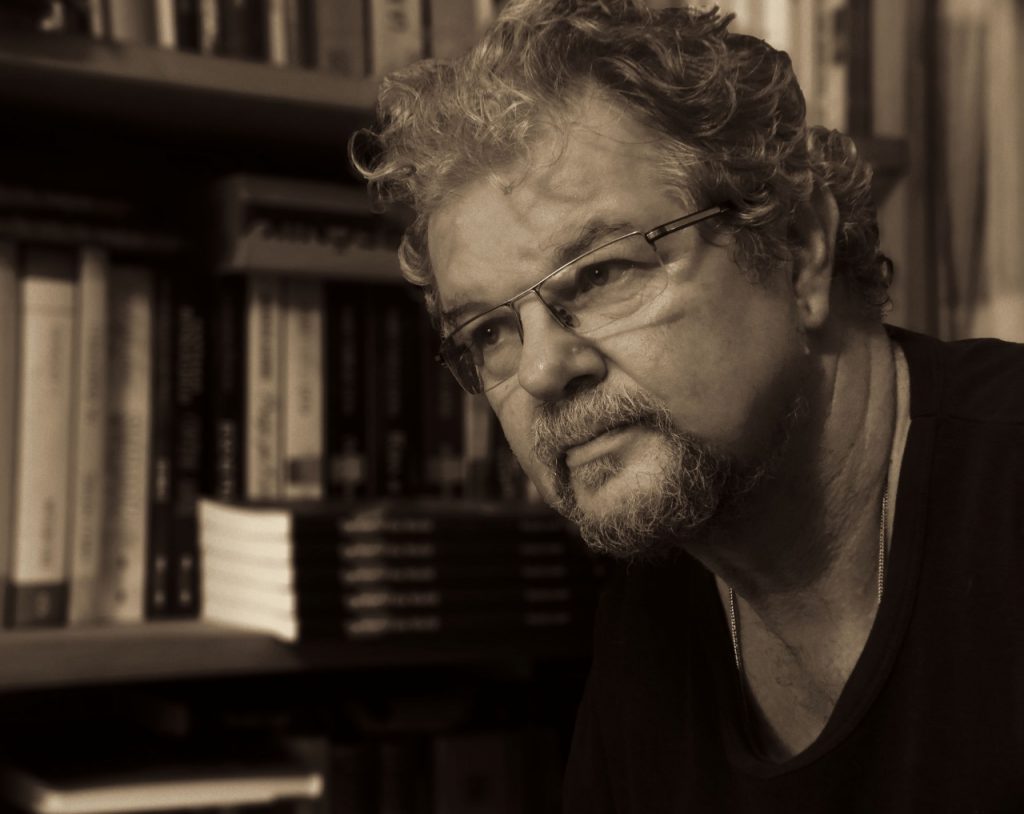ABOUT THE AUTHOR
BRANKO ANĐIĆ, (1952, Belgrade) a writer, translator, professor of literature and journalist.
Born in Belgrade, Branko Anđić graduated from the Department of General Literature and Theory of Literature of the Faculty of Philology in Belgrade. A co-founder and editor of the journal for world literature Pismo (Letters), Anđić is a former editorial member of Književne novine (Literary Journal). Since 1990 he has been living and working in Buenos Aires.
He has published the books of prose: Posle svirke (After a Gig, 1983), Lavica liže rane (A Lioness
Licks Her Wounds, 1989), Kao iz kabla (Pouring Rain, 2003), Ovo je istinita priča (This Is a True Story, 2007), Veličina sveta (The Size of the World, 2008), Play back (2012) and Teški metal (Heavy Metal, 2014).
Anđić has prepared several Latin American anthological story selections and has translated works of some of the most popular Latin American, Spanish and North American writers such as Jorge Luis Borges, Mario Vargas Llosa, Gabriel Garcia Márkuez, José Donoso, Carlos Fuentes, Ana Maria Shua, Liliana Heer, Pedro Juan Gutiérrez, José Ortega y Gasset, David Sedaris, Isodoro Blaisten, David Bezmozgis.
He is the 2011 winner of the literary prize “Miloš Crnjanski” awarded by the Government of the Republic of Serbia.
About the novel Play-back
The kaleidoscopic structure of the novel ,,Play-back” by Branko Anđić is essentially connected with music as a paradigm of global life experience. It is from music and everything musical in their lives that his heroes, overwhelmed by nostalgia, are trying to arrive at a story which, for them, is a home for the self. Different narrative insights into the world, strategies and tonalities of storytelling, ranging from confessional prose through pseudo-psychoanalytical records to fantasy, arranged in the 27 narrative wholes, are linked by a nonlinear logic that resembles the open structure of Rubik’s Cube, while the focal point of this slow and elegiac book about growing up and aging lies in the experience of music. In the layers of distinctive verbal aesthetics we recognize it as a gap between the said and the played.
From the Foreword
About the novel Teški metal (Heavy Metal)
The Lego bricks that made up the eternity’s bad joke called Yugoslavia fell apart as quickly as it took Anđić to cover – in a twine of several fragmentary units, quite sufficient to paint an impossible ideological (political) system based on false postulates, with a couple of well-profiled characters – the road from a mature, “ideal” community to a complete collapse that came after the bloody, gangster-like petty interests in whose wake not only the homes and the supposed “state” but also definitely lost souls of its citizens remained empty.
Đorđe Pisarev
What kind of backwaters a myth forks into, and what the fate is of the logically nonsensical phrases “After Tito – Tito!” is shown in the mosaic story of the new Branko Anđić’ novel ,,Teški metal”, whose arch of events descends from the top of the Yugoslav utopia of the 1980s, when the “Consilium” news made headlines and the generally accepted incredibility that the leader might die, towards the dark atmosphere of the 1990s, where the news are of the war. Following a reality that has long since melted and a history that consistently learns that it cannot teach us anything, Anđić serves to his readers the developments related to the period between two springs – the one of 1980 and the one of 1992 – and essentially witnesses the low lifestyle register of a few of his heroes before whose eyes the Yugoslav utopia once appeared as just that – a utopia, and then disappeared completely.
Nenad Šaponja
